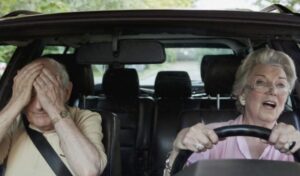
Friends and family members are often first to notice the signs of unsafe driving. Another way to evaluate driving skills is to have the person’s driving skills assessed by a professional. The American Occupational Therapy Association maintains a national database of driving specialists, or you can check with your state’s Department of Motor Vehicles or a health care professional to recommend someone who can evaluate driving skills. Note that there may be fees associated with these types of assessments. There are also a number of online resources for assessing driving skills yourself.
What are the laws about dementia and driving?
State laws vary regarding when a person with Alzheimer’s should stop driving. Some states will automatically revoke a license when a person is diagnosed with Alzheimer’s or dementia. Other states may offer the chance for a diagnosed person to take and pass a driving test.
Many states require retaking a driving test when there is reason to believe someone may be unable to safely operate their vehicle or over a certain age. Information on unsafe driving can come from law enforcement, medical personnel, concerned citizens, and family members. Check with your state’s department of motor vehicles for more information.
What to do when driving becomes unsafe
If you notice unsafe driving, you will need to take steps to keep the person from driving. It is always a tough conversation, and it’s important to do it in a caring way. Try to understand how unhappy they may be to admit they have reached this new stage.
Here are some ways to help stop people with Alzheimer’s from driving:
- Try talking about your concerns with the person. Find tips on talking with someone about no longer driving.
- Take them to get a driving test.
- Ask the person’s doctor to tell them to stop driving. The doctor can write “Do not drive” on a prescription pad and you can show this to the person.
- If necessary, hide the car keys, disable the car, move it out of sight, or consider selling it.
- Finding other transportation options
- Losing the ability to drive can be difficult, but driving is only one form of transportation.
- Consider finding other ways that the person with Alzheimer’s can travel safely on their own.
Your local Area Agency on Aging can help you find local services that may include free or low-cost buses, taxis, or carpools for older people. Call 800-677-1116 or search the Eldercare Locator online. You also can try searching Rides in Sight or calling 855-607-4337, a service of the nonprofit ITN America that provides information about transportation options for older adults.
Some churches and community groups have volunteers who take older adults where they want to go. Family and friends are another great resource.
For more information about driving safety and dementia NIA Alzheimer’s and related Dementias Education and Referral (ADEAR) Center 800-438-4380. www.nia.nih.gov/alzheimers
